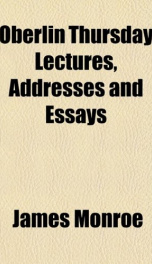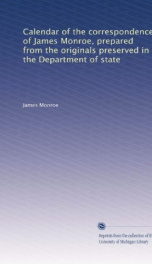Monroe James

James Monroe (April 28, 1758 – July 4, 1831) was the fifth President of the United States (1817–1825). His administration was marked by the acquisition of Florida (1819); the Missouri Compromise (1820), in which Missouri was declared a slave state; the admission of Maine in 1820 as a free state; and the profession of the Monroe Doctrine (1823), declaring U.S. opposition to European interference in the Americas, as well as breaking all ties with France remaining from the War of 1812. James Monroe was born on April 28, 1758, in a wooded area of Westmoreland County, Virginia. The site is marked and is one mile from what is known today as Monroe Hall, Virginia. Monroe's father, Spence Monroe (1727–1774) was a moderately prosperous planter who also learned the carpentry trade. His mother, Elizabeth Jones Monroe (1730–1774), married Spence Monroe in 1752. They had four children live to maturity: Between the ages of 11 and 16, Monroe studied at Campbelltown Academy, a school run by the Reverend Archibald Campbell of Washington Parish. There he excelled as a prodigious pupil and progressed through Latin and mathematics at a rate faster than that of most boys his age. John Marshall, later Chief Justice of the United States, was among his classmates. At the age of 16, Monroe enrolled in the College of William and Mary. However in 1774, the atmosphere on the Williamsburg campus was not conducive to study, and the prospect of rebellion against King George charged most of the students, including Monroe, with patriotic fervor. In June 1775, after the battles of Lexington and Concord, Monroe joined 24 older men in raiding the arsenal at the Governor's Palace. The 200 muskets and 300 swords they appropriated helped arm the Williamsburg militia. The following spring, Monroe dropped out of college and joined the Continental army. He never returned to earn a degree. Between 1780 and 1783, he studied law under Thomas Jefferson. Monroe fought in the War of Independence, serving with distinction at the Battle of Trenton, where he was shot in his left shoulder. He spent three months in Bucks County, Pennsylvania, recuperating from his wound. He is depicted holding the flag in the famous painting of Washington Crossing the Delaware. Following his war service, he practiced law in Fredericksburg, Virginia. James Monroe married Elizabeth Kortright (1768-1830), daughter of Laurence Kortright and Hannah Aspinwall Kortright, on February 16, 1786, in New York City. After a brief honeymoon on Long Island, the Monroes returned to New York to live with her father until Congress adjourned. The Monroes had the following children: Monroe was elected to the Virginia House of Delegates in 1782 and served in the Continental Congress from 1783 to 1786. He ran for a seat on the 1st Congress but was defeated by future President James Madison. As a youthful politician, he joined the anti-Federalists in the Virginia Convention which ratified the Constitution, and in 1790, was elected United States Senator.[1] Monroe resigned his Senate seat after being appointed Minister to France in 1794.[2] As ambassador, Monroe was able to secure the release of Thomas Paine when the latter was arrested for his opposition to the execution of Louis XVI. His task of reassuring France that Washington's policy of strict neutrality did not favor Britain was sabotaged, however, by the signing of the Jay Treaty, particularly as Monroe had not been provided with a copy and thus was unable to respond to French requests to see its contents. He was recalled in 1796 due to Federalist discontent with deteriorating French relations.[3] Out of office, Monroe returned to practicing law in Virginia until elected governor there, serving from 1799 to 1802. He called out the state militia to suppress Gabriel's Rebellion. Gabriel and 26 other enslaved people who participated were hanged. In reaction, the Virginia and other legislatures passed restrictions on free blacks, as well as the education, movement and hiring out of the enslaved. Under the first Jefferson administration, Monroe was dispatched to France to assist Robert R. Livingston to negotiate the Louisiana Purchase. Monroe was then appointed Minister to the Court of St. James (Britain) from 1803 to 1807. In 1806 he negotiated a treaty with Britain to replace the Jay Treaty of 1794, but Jefferson rejected it as unsatisfactory, as the treaty contained no ban on the British practice of impressment of American sailors. As a result, the two nations moved closer toward the War of 1812. Monroe returned to the Virginia House of Delegates and was elected to another term as governor of Virginia in 1811, but he resigned a few months into the term. He then served as Secretary of State from 1811 to 1814. When he was appointed to the post of Secretary of War in 1814, he stayed on as the Secretary of State ad interim. At the war's end in 1815, he was again commissioned as the permanent Secretary of State, and left his position as Secretary of War. Thus from October 1, 1814, to February 28, 1815, Monroe effectively held both cabinet posts. Monroe stayed on as Secretary of State until the end of the James Madison Presidency, and the following day Monroe began his term as the new President of the United States. In both the presidential elections of 1816 and 1820 Monroe's run for office was difficult to oppose. Attentive to detail, well prepared on most issues, nonpartisan in spirit, and above all pragmatic, Monroe managed his presidential duties well. He made strong Cabinet choices, naming a southerner, John C. Calhoun, as Secretary of War, and a northerner, John Quincy Adams, as Secretary of State. Only Henry Clay's refusal to accept a position kept Monroe from adding an outstanding westerner. Most appointments went to deserving Democratic-Republicans, but he did not try to use them to build the party's base. Indeed, he allowed the lower posts to take on diverse political appointees, which reduced anxiety and led to the naming of this period in American history as the "Era of Good Feelings." To build national trust, he made two long national tours in 1817. Frequent stops allowed innumerable ceremonies of welcome and good will. All the while the Federalist Party continued to diminish. The party maintained its vitality and organizational integrity at the state and local level but dwindled at the federal level due to redistricting. The party's Congressional caucus stopped meeting, and there were no notable national conventions after Monroe's last term. During his presidency, Congress demanded high subsidies for internal improvements, such as for the improvement of the Cumberland Road.[4] Monroe vetoed the Cumberland Road Bill, which provided for yearly improvements to the road, because he believed it to be unconstitutional for the government to have such a large hand in what was essentially a civics bill deserving of attention on a state by state basis. This sort of defiance underlined Monroe's populist ideals and added credit to the local offices that he was so fond of visiting on his speech trails. [5] The era of "good feelings" endured until 1824, and carried over, albeit somewhat convexly, to John Quincy Adams who was elected President by the House of Representatives in what Andrew Jackson alleged to be a "corrupt bargain." Monroe's popularity, however, was undiminished even when following difficult nationalist policies as the country's commitment to nationalism was starting to show serious fractures. The Panic of 1819 caused a painful economic depression. The application for statehood by the Missouri Territory, in 1819, as a slave state failed. An amended bill for gradually eliminating slavery in Missouri precipitated two years of bitter debate in Congress. The Missouri Compromise bill resolved the struggle, pairing Missouri as a slave state with Maine, a free state, and barring slavery north of the lattitude 36/30' N forever. The Missouri Compromise lasted until 1857, when it was declared unconstitutional by the U.S. Supreme Court as part of the Dred Scott decision. Through it all, Monroe is probably best known for the Monroe Doctrine, which he delivered in his message to Congress on December 2, 1823. In it, he proclaimed the Americas should be free from future European colonization and free from European interference in sovereign countries' affairs. It further stated the United States' intention to stay neutral in European wars and wars between European powers and their colonies, but to consider any new colonies or interference with independent countries in the Americas as hostile acts toward the United States. Although it is Monroe's most famous contribution to society, it is important to note that the speech was written by Secretary of State John Quincy Adams. Monroe began to formally recognize the young sister republics (the former Spanish colonies) in 1822. He and John Quincy Adams had wished to avoid trouble with Spain until it had ceded the Floridas to the U.S., which was done in 1821. Britain, with its powerful navy, also opposed re-conquest of Latin America and suggested that the United States join in proclaiming a "hands off" policy. Ex-Presidents Jefferson and Madison counseled Monroe to accept the offer, but Quincy Adams advised, "It would be more candid ... to avow our principles explicitly to Russia and France, than to come in as a cock-boat in the wake of the British man-of-war." Monroe accepted Adams' advice. Not only must Latin America be left alone, he warned, but also Russia must not encroach southward on the Pacific coast. "...the American continents," he stated, "by the free and independent condition which they have assumed and maintain, are henceforth not to be considered as subjects for future colonization by any European Power." Some 20 years after Monroe died in 1831 this became known as the Monroe Doctrine. James Monroe in December 1817 ordered Andrew Jackson to lead a campaign in Georgia against the Seminole and Creek Indians. Jackson was also charged with preventing Spanish Florida from becoming a refuge for runaway slaves. Critics later alleged that Jackson exceeded orders in his Florida actions. His directions were to "terminate the conflict."
do you like this author?
What readers are saying
What do you think? Write your own comment on this book!
write a commentWhat readers are saying
What do you think? Write your own comment on this author!
write a commentBook list

the memoir of james monroe esq relating to his unsettled claims upon the peopl
Series:
Unknown
Year:
Unknown
Raiting:
2.5/5
Show more
add to favoritesadd In favorites

present wants of the nation pacification resumption of specie payments the si
Series:
Unknown
Year:
Unknown
Raiting:
4.5/5
Show more
add to favoritesadd In favorites
Book list

the memoir of james monroe esq relating to his unsettled claims upon the peopl
Series:
Unknown
Year:
Unknown
Raiting:
2.5/5
Show more
add to favoritesadd In favorites

present wants of the nation pacification resumption of specie payments the si
Series:
Unknown
Year:
Unknown
Raiting:
4.5/5
Show more
add to favoritesadd In favorites

oberlin thursday lectures addresses and essays
Series:
Unknown
Year:
Unknown
Raiting:
3/5
Purchase of this book includes free trial access to www.million-books.com where you can read more than a million books for free. This is an OCR edition with typos. Excerpt from book: THE EARLY ABOLITIONISTS. FREDERICK DOUGLASS. An Address Delivered Before The I'nion Library Association Of Obkr1.in College. I KNEW Frederick Douglass exceedingly well. It began on thiswise. In the summer of 1841, fifty-six years ago next summer, I went from my home in Connecticut to Millbury, Massachusetts, to attend an anti-slavery convention. There, for the first time, I met Mr. Douglass. I was just twenty years of age. He was about four years older, and had been three years out of slavery. This was the first occasion, beyond the limits of my own county, when I spoke at a public meeting, and Mr. Douglass vas just beginning to address large audiences. I had some conversation with him, and liked him from the first. The tall, straight, well-built youth, with a strong head, eyes and face full of humor, and a certain frank manliness ofbearing, won from me, at once, a kindly esteem which grew in strength for more than half a century, and until I read in the morning journal that he had been suddenly called to his reward. When I saw him at Millbury., I did not know that he was a great man ; but even then there was something in his manner of thought and expression, that might have led me to suspect it. He was genial and affable and prone to laugh at his own deficiencies. He could read and write, and had acquired some general knowledge. On a table near him was a leaf of paper on which were scrawled perhaps two-dozen words. "What is this?" I said. "That," he replied with a laugh, " is my speech." At Millbury, I also met for the first time, that great leader in reform, William Lloyd Garrison. A friend who introduced me said to him that I was thinking of going to college. Fixing an earnest look upon me, he replied, "The anti- slavery field is the best college for a young m...
Show more
add to favoritesadd In favorites

calendar of the correspondence of james monroe
Series:
Unknown
Year:
Unknown
Raiting:
3/5
This volume is produced from digital images created through the University of Michigan University Library's large-scale digitization efforts. The Library seeks to preserve the intellectual content of items in a manner that facilitates and promotes a variety of uses. The digital reformatting process results in an electronic version of the original text that can be both accessed online and used to create new print copies. The Library also understands and values the usefulness of print and makes reprints available to the public whenever possible. This book and hundreds of thousands of others can be found in the HathiTrust, an archive of the digitized collections of many great research libraries. For access to the University of Michigan Library's digital collections, please see http://www.lib.umich.edu and for information about the HathiTrust, please visit http://www.hathitrust.org
Show more
add to favoritesadd In favorites

a view of the conduct of the executive in the foreign affairs of the united sta
Series:
Unknown
Year:
Unknown
Raiting:
4/5
Show more
add to favoritesadd In favorites

State of the Union Address
Series:
Unknown
Year:
Unknown
Raiting:
3.5/5
A precise knowledge of our relations with foreign powers as respects our negotiations and transactions with each is thought to be particularly necessary. Equally necessary is it that we should for a just estimate of our resources, revenue, and progress in every kind of improvement connected with the national prosperity and public defense. It is by rendering justice to other nations that we may expect it from them. It is by our ability to resent injuries and redress wrongs that we may avoid them.
Show more
add to favoritesadd In favorites
What readers are saying
What do you think? Write your own comment on this author!
write a commentif you like Monroe James try:
readers also enjoyed
What readers are saying
What do you think? Write your own comment on this author!
write a commentGenre
if you like Monroe James try:
readers also enjoyed
Do you want to read a book that interests you? It’s EASY!
Create an account and send a request for reading to other users on the Webpage of the book!


